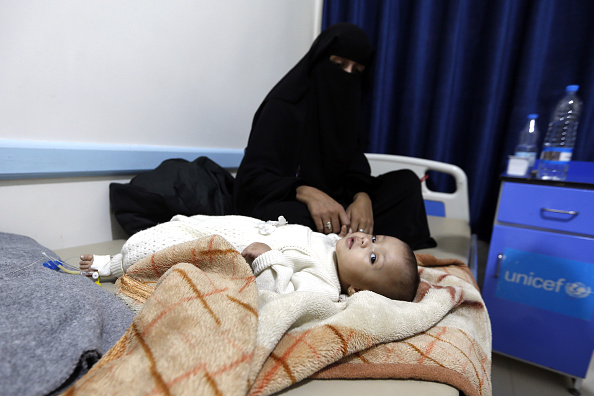In Yemen, a cholera outbreak is making a bleak situation worse


A free daily email with the biggest news stories of the day – and the best features from TheWeek.com
You are now subscribed
Your newsletter sign-up was successful
Most of Yemen's infrastructure has been destroyed and there are shortages of everything from food to medicine, and as fighting rages on, it's unlikely that things will improve anytime soon.
The United Nations says the humanitarian crisis in the war-torn Middle Eastern country is the worst in the world, and 10 million people need immediate assistance. The fighting began in 2014, when Houthi rebels faced off against the government; in 2015, a Saudi-led coalition began fighting the rebels in order to restore the government, and today, the Houthis control the west and the government and its backers control the south and east. Over the past two-and-a-half years, constant airstrikes have killed civilians and destroyed bridges and hospitals, and because the Saudi coalition has shut down the capital's international airport to civilian planes, supplies cannot fly in and sick and injured Yemenis cannot leave for treatment in other countries.
The New York Times has an in-depth look at one of the biggest problems facing Yemen: cholera, the bacterial infection that is spread by feces-contaminated water. It is not life-threatening in developed countries, and can be treated with antibiotics, but in Yemen, it's hitting children and the elderly hard. As garbage piles up in the streets and sewage systems fail, Yemenis have to get their water from wells that can easily be contaminated. In just three months, cholera has killed nearly 2,000 Yemenis, the Times reports, and more than 500,000 people are infected.
The Week
Escape your echo chamber. Get the facts behind the news, plus analysis from multiple perspectives.

Sign up for The Week's Free Newsletters
From our morning news briefing to a weekly Good News Newsletter, get the best of The Week delivered directly to your inbox.
From our morning news briefing to a weekly Good News Newsletter, get the best of The Week delivered directly to your inbox.
Half of all Yemenis do not have quick access to an operating medical center, and many have to borrow money to get treatment; a Yemeni soldier who told the Times he has not been paid in eight months brought his 6-year-old daughter to the capital, Sana'a, for cholera treatment. She is malnourished, after surviving off of yogurt and milk from neighbors, and her father said they are "just waiting for doom or for a breakthrough from heaven." As humanitarian workers watch the situation deteriorate, they are cognizant of the fact that if they had additional funds, they could make more of a difference — the United Nations estimates Yemen needs $2.3 billion in humanitarian aid this year, but only 41 percent has been received. Read the entire report at The New York Times.
A free daily email with the biggest news stories of the day – and the best features from TheWeek.com
Catherine Garcia has worked as a senior writer at The Week since 2014. Her writing and reporting have appeared in Entertainment Weekly, The New York Times, Wirecutter, NBC News and "The Book of Jezebel," among others. She's a graduate of the University of Redlands and the Columbia University Graduate School of Journalism.
-
 6 of the world’s most accessible destinations
6 of the world’s most accessible destinationsThe Week Recommends Experience all of Berlin, Singapore and Sydney
-
 How the FCC’s ‘equal time’ rule works
How the FCC’s ‘equal time’ rule worksIn the Spotlight The law is at the heart of the Colbert-CBS conflict
-
 What is the endgame in the DHS shutdown?
What is the endgame in the DHS shutdown?Today’s Big Question Democrats want to rein in ICE’s immigration crackdown
-
 ‘One Battle After Another’ wins Critics Choice honors
‘One Battle After Another’ wins Critics Choice honorsSpeed Read Paul Thomas Anderson’s latest film, which stars Leonardo DiCaprio, won best picture at the 31st Critics Choice Awards
-
 A peek inside Europe’s luxury new sleeper bus
A peek inside Europe’s luxury new sleeper busThe Week Recommends Overnight service with stops across Switzerland and the Netherlands promises a comfortable no-fly adventure
-
 Son arrested over killing of Rob and Michele Reiner
Son arrested over killing of Rob and Michele ReinerSpeed Read Nick, the 32-year-old son of Hollywood director Rob Reiner, has been booked for the murder of his parents
-
 Rob Reiner, wife dead in ‘apparent homicide’
Rob Reiner, wife dead in ‘apparent homicide’speed read The Reiners, found in their Los Angeles home, ‘had injuries consistent with being stabbed’
-
 Hungary’s Krasznahorkai wins Nobel for literature
Hungary’s Krasznahorkai wins Nobel for literatureSpeed Read László Krasznahorkai is the author of acclaimed novels like ‘The Melancholy of Resistance’ and ‘Satantango’
-
 Primatologist Jane Goodall dies at 91
Primatologist Jane Goodall dies at 91Speed Read She rose to fame following her groundbreaking field research with chimpanzees
-
 Florida erases rainbow crosswalk at Pulse nightclub
Florida erases rainbow crosswalk at Pulse nightclubSpeed Read The colorful crosswalk was outside the former LGBTQ nightclub where 49 people were killed in a 2016 shooting
-
 Trump says Smithsonian too focused on slavery's ills
Trump says Smithsonian too focused on slavery's illsSpeed Read The president would prefer the museum to highlight 'success,' 'brightness' and 'the future'
